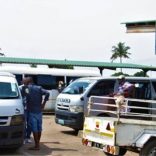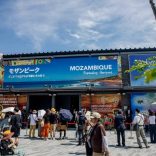Mozambique: Hauliers want less police corruption to reduce road accidents
Mozambique Elections: Vodacom tells customers that Internet “restrictions” have been “removed”

FILE - For illustration purposes only. [File photo: Carta de Moçambique]
Mobile telecommunications operator Vodacom, one of three that operates in Mozambique, sent a message to customers yesterday stating that “restrictions” on Internet access had been “removed”.
“The restrictions that led to the Internet outage have now been removed,” the message reads.
Mobile telecommunications operators Tmcel and Movitel, which also operate in Mozambique, have acknowledged problems with their Internet service in recent weeks.
The Mozambican Minister of Transport and Communications said on 10 November that the restrictions on the Internet, especially on access to social networks, were the result of the operators’ own actions, so that it [the internet] would not be used to “destroy” the country, in the context of the post-election demonstrations.
“It is a combination of many factors. The destruction of infrastructure, but also the security of the operators themselves, who have to work in a secure environment. I can also say that the operators are also liable when they see that the Internet is being used to destroy the country,” said Minister Mateus Magala, when questioned by journalists.
“They certainly took measures . The Internet is a collective asset, not an evil used to destroy our country,” he stated.
Access to the Internet, particularly social networks and WhatsApp, has been limited for more than two weeks. Social media platforms are the usual means of calling for and publicising demonstrations.
“When we see violations that endanger the integrity of all Mozambicans in the nation, we have to act accordingly, so that our means of communication are not used to destroy the country. It is in this context that, for example, many people, because of security, did not go to work. Was it the Government that told them not to go to work? No, the Government said ‘let’s work’, but people made the decision, because they perceived the risk where they are, that they could not move around,” Magala added.
The minister appealed to the population “to be civil and to protect transport and communications infrastructures”, so that “there is no interruption” to these services in the country.
The announcement by the National Electoral Commission (CNE) of Mozambique, on October 24, of the results of the October 9 elections, in which it attributed the victory to Daniel Chapo, supported by the Mozambique Liberation Front (Frelimo, the party in power since 1975) in the election for President of the Republic, with 70.67% of the votes, sparked popular protests, called by presidential candidate Venâncio Mondlane.
According to the CNE, Mondlane came in second place, with 20.32%, but he stated that he did not recognize the results, which still have to be validated and proclaimed by the Constitutional Council, which has no set deadline for this purpose and is still analysing the dispute.
After street protests that paralyzed the country on October 21, 24 and 25, Mondlane once again called on the population to a seven-day general strike, starting on October 31, with nationwide protests and a demonstration concentrated in Maputo on Thursday, November 7, which caused chaos in the capital, with several barricades, burning tires and police firing shots and tear gas throughout the day to disperse the situation.
Venâncio Mondlane has said that the protests will continue until “electoral truth is restored”.













Leave a Reply
Be the First to Comment!
You must be logged in to post a comment.
You must be logged in to post a comment.